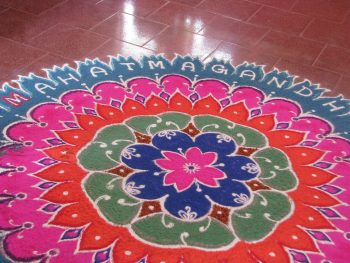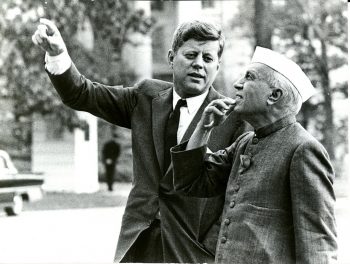Sahir Ludhianvi: A Poet of the Silver Screen (Part 3) Posted by Rachael on Oct 15, 2017 in Hindi Language, Uncategorized
If you haven’t yet read parts 1 and 2 of this series on the renowned poet and lyricist Sahir Ludhianvi, check them out now!
In this next poem I’ll share with you, Ludhianvi once again manages to upend a traditional concept and transform it into an entirely different meditation on justice, the rights of the oppressed and the corruption of those in power. The following poem, titled “26 January/२६ जनवरी/جنوری ۲۶,” refers to India’s Republic Day, which is one of the holidays that celebrates India’s Independence from the British Empire in 1947 (the other days are India’s Independence Day on August 15th and Gandhi Jayanti/गांधी जयंती, celebrating Mahatma Gandhi’s birthday, on October 2nd). Specifically, India’s Republic Day commemorates 26 January 1950, the day on which the Constitution of Independent India was put into effect; this day marks the occasion on which the newly-formed country promulgated and instituted its own independent governing document to replace the British “Government of India Act” (1935) that had previously been in place. Additionally, on this day in 1930, the Indian National Congress declared Indian Independence (Purna Swaraj/पूर्ण स्वराज) from the British, although this declaration would not go into formal effect until 17 years later.
Ludhianvi’s poem, instead of an unquestioning celebration of India’s victory in obtaining independence and asserting the validity of its own democratic status, critiques and calls into question the values of the society evolving during the time of India’s first prime minister, Jawaharlal Nehru/जवाहरलाल नेहरू. He speaks with disillusionment and sadness of how people continue to employ religion to brutally divide themselves from others and with disappointment of the golden promises of an independent future that have not been fulfilled in a post-Independence India ridden with the exploitation of the poor and the hypocrisy of the powerful. While reading this poem, you will notice it is not in a couplet style as was Ludhianvi’s “Taj Mahal/ताज महल/تاج محل”; while “Taj Mahal” is in a “ghazal” (ग़ज़ल) style of Urdu poetry (made up of rhyming couplets of the same meter and a refrain: “मेरी महबूब, कहीं और मिलाकर मुझसे”), “26 January” is a nazm (नज़्म) or, in this case, a 20-line poem with an alternating rhyme scheme and a rhyming couplet at the end. However, there are many different types of nazms with differing rhyme schemes.
|
Urdu Text |
English Translation |
Hindi Text and Roman Transliteration |
|
آوٰ کہ آج غور کریں اس سوال پر |
Come, so that we may reflect on this question today: |
आओ कि आज ग़ौर करें इस सवाल पर (aao ki aaj gaur karen is savaal par) |
|
دیکھے تھے ہم نے جو وہ حسیں خواب کیا ہوے |
We have seen what has become of those beautiful dreams/visions |
देखे थे हम ने जो वह हसीन ख़्वाब क्या हुए (dekhe the hum ne jo voh haseen khvaab kyaa hue) |
|
دولت بڑھی تو ملک میں افلاس کیوں بڑا |
If wealth has grown, why has poverty in our country increased |
दौलत बढ़ी तो मुल्क में इफ़्लास क्यों बढ़ा (daulat barhi to mulk me iflaas kyoon barhaa) |
|
خشحالیٴ اے عوام کے اسباب کیا ہوے |
What became of the means to ensure the prosperity of the common people |
ख़ुश-हाली-ए-अवाम के अस्बाब क्या हुए (khush-haali-e-avaam ke asbaab kyaa hue) |
|
جو اپنے ساتھ ساتھ چلے کوٰ اے دار تک |
Those who traveled with us to the street of gallows |
जो अपने साथ साथ चले कू-ए-दार तक
(jo apne saath saath chale koo-e-daar tak) |
|
وہ دوست، وہ رفیق، وہ احباب کیا ہوے |
What became of those friends, those companions, those loved ones |
वह दोस्त, वह रफ़ीक़, वह अहबाब क्या हुए (voh dost, voh rafeek, voh ehbaab kyaa hue) |
|
کیا مول لگ رہا ہے شہیدوں کے خون کا |
What price have we placed on the blood of martyrs |
क्या मोल लग रहा है शहीदों के ख़ून का (kyaa mol lag rahaa hai shaheedon ke khuun kaa) |
|
مرتے تھے جن پے ہم وہ سزایاب کیا ہوے |
What became of those “worthy of punishment,” for whom we were willing to die |
मरते थे जिन पे हम वह सज़ा-याब क्या हुए (marte the jin pe hum voh sazaa-yaab kyaa hue) |
|
بے کس برہنگی کو کفن تک نہیں نسین |
Fate did not provide them with even a shroud to cover their helpless, bare corpses |
बे-कस बरहनगी को कफ़न तक नहीं नसीब (be-kas barahnagee ko kafan tak nahin naseeb) |
|
وہ وعدہ ہاےٴ اطلس و کمخواب کیا ہوے |
What became of those gilded promises |
वह वादा-हा-ए-अतलस-ओ-किम-ख़्वाब क्या हुए (voh vaadaa-haa-e-atlas-o-kim-khvaab kyaa hue) |
|
جمہوریت نواز بشر دوست امن خواہ |
“Preserver of democracy,” “Friend of humanity,” “Solicitor of peace” |
जम्हूरियत-नवाज़ बशर-दोस्त अम्न-ख़्वाह (jamhooriyat-navaaz, bashar dost, aman khvaah) |
|
خد کو جو خد دیے تھے وہ القاب کیا ہوے |
What became of those honorable titles we gave to ourselves |
ख़ुद को जो ख़ुद दिए थे वह अलक़ाब क्या हुए (khud ko jo khud diye the voh alqaab kyaa hue) |
|
مذہب کا روگ آج بھی کیوں لا علاج ہے |
Why is the disease of religion still incurable |
मज़हब का रोग आज भी क्यों ला-इलाज है (Mazhab kaa rog aaj bhi kyoon laa-ilaaj hai) |
|
وہ نسخہ ہاےٰ نادر و نایان کیا ہوے |
What became of those rare and precious remedies |
वह नुस्ख़ा-हा-ए-नादिर-ओ-नायाब क्या हुए (voh nuskhaa-haa-e-naadir-o-naayaab kyaa hue) |
|
ہر کوچہ شعلہ زاز ہے ہر شہر قتل گاہ |
Every lane is a field of flames, every city is a place of carnage |
हर कूचा शोला-ज़ार है, हर शहर क़त्ल-गाह (har koocha sholaa-zaar hai, har sheher qatl-gaah) |
|
یکجہتیٰ اے حیات کے آداب کیا ہوے |
What became of the civilities of life’s unity (oneness) |
यक-जेहती-ए-हयात के आदाब क्या हुए (yak-jehtee-e-hayaat ke aadaab kyaa hue) |
|
سحراٴ اے تیرگی میں بھٹکتی ہے زندگی |
Life wanders in a dark wasteland |
सहरा-ए-तीरगी में भटकती है ज़िंदगी (seheraa-e-teergee me bhataktee hai zindagee) |
|
ابھرے تھے جو افق پے وہ مہتاب کیا ہوے |
What became of those moons, emerging on the horizon |
उभरे थे जो उफ़ुक़ पे वह महताब क्या हुए (ubhre the jo ufuk pe voh mehtaab kyaa hue) |
|
مجرم ہوں میں اگر تو گنہ گار تم بھی ہو |
If I am a criminal, you too are sinners |
मुजरिम हूँ मैं अगर तो गुनहगार तुम भी हो (mujrim huun me agar to gunahgaar tum bhi ho) |
|
اے رہبران اے قوم خطا کار تم بھی ہو |
Oh, leaders of this nation, you too are guilty |
ए रहबरान-ए-क़ौम ख़ता-कार तुम भी हो (ai rehbaraan-e-qaum khataa-kaar tum bhi ho) |

Build vocabulary, practice pronunciation, and more with Transparent Language Online. Available anytime, anywhere, on any device.






